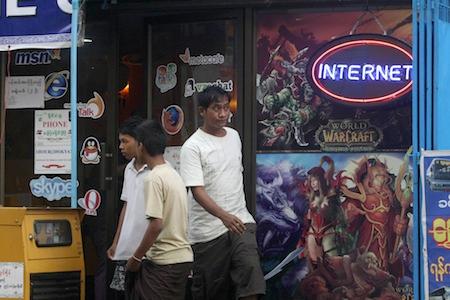YouTube, BBC ban lifted in Burma
An Internet cafe in Yangon, Myanmar’s largest city. With busy cyber cafes across the main city Yangon, the web offers a way to tap the city’s youth, despite slow connections, frequent power cuts and huge risks over online activity that the regime deems subversive.
In a surprise move from Burma's paranoid and reclusive government, blocks on YouTube and foreign news Web sites are suddenly gone.
The now-unblocked online outlets include YouTube, the BBC and Voice of America, according to the Associated Press. Reuters reports that regional media, such as Thailand's Bangkok Post and Singapore's Straits Times are also back online.
Even more surprising is the unblocking of outlets run by Burmese exiles — such as the Democratic Voice of Burma — that more or less specialize in publicizing the misdeeds of Burma's authoritarian regime.
This is quite an about face for a quasi-totalitarian state that has repeatedly hit mere anti-government pamphleteers with decades-long sentences. Just this week, a videographer for the Democratic Voice of Burma caught an 18-year sentence for filming the scene of a bombing last year.
The regime can't possibly enjoy the type of coverage that foreign outlets produce on Burma, officially known as Myanmar. Outside news agencies, Global Post included, rarely publish news that skirts mention of the military-backed government's awful human rights record and ongoing wars against well-armed minority groups. The regime's censorship is nothing compared to the accusations of forced labor, torched villages and worse that routinely appear in the foreign media.
A recent piece in The Economist articulates the shifting tides in Burma and outside observers "entrenched" cynicism:
"Progress in Myanmar, an Australian foreign minister once remarked, comes at the pace of glue flowing up a hill. Lately, however, it has become a brook bickering merrily down the valley. Cynicism about the regime’s intentions is so entrenched that few observers see this as more than an optical illusion."
That about sums up the take from Shawn Crispin, a longtime Southeast Asia reporter and representative of Southeast Asia Representative of the Committee to Protect Journalists.
Freeing up Web restrictions is "hardly a noteworthy move toward more press freedom," he told the AP, adding that only 0.3 percent of Burma's population has Web access. Never mind the fact that outside of Burma's largest city, Yangon, few can read English.
"These sites may now be available in Burma," Crispin told the AP, "but Internet users risk arrest and even prison for accessing them."
Every day, reporters and producers at The World are hard at work bringing you human-centered news from across the globe. But we can’t do it without you. We need your support to ensure we can continue this work for another year.
Make a gift today, and you’ll help us unlock a matching gift of $67,000!
